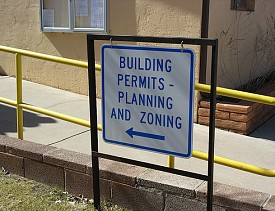Why and How to Pull Permits

You’re pretty smart, but you may feel as though you have lost some brain cells by the time you finish the process of obtaining building permits and passing city inspections. Dealing with local government (and sometimes several departments within said government) can be daunting, but it’s a necessary part of remodeling or construction. Here is a basic overview of city permitting to minimize frustration.
Which projects require permits?
Rules vary by municipality, but you are likely to need a permit for any project beyond basic repairs and maintenance or simple aesthetic upgrades. For example, repainting or replacing the cabinets probably doesn’t require a permit. However, replacing a water heater or shifting the kitchen plumbing probably needs a permit.
Replacing the roof or adding new space also generally requires a building permit. The same goes for changing the use of existing space, such as adding a bathroom or finishing a basement.
Some of these requirements may seem like unnecessary government intrusion, but regulations are generally enforced in the name of safety. While pulling permits can be a hassle, it’s comforting to know that the DIY-obsessed neighbor is less likely burn down his house (and yours) with his renegade wiring projects because he needs permits.
When should you apply for a permit?
Navy Rear Admiral Grace Hopper is credited with saying, “It’s easier to ask forgiveness than it is to get permission.” With due respect to the admiral, this is not true in the world of building permits. Start getting permits before starting any project.
If city officials spot a project without proper permits and inspections, they might force the work to stop until permits are obtained. This could leave you without a functioning kitchen for weeks.
Moreover, many cities impose hefty fines for work started without permits. Even if you try to slip under the radar, potential buyers and their real-estate agents will likely require proof of inspection for your work when you try to sell the house. You may pay a hefty premium for such after-the-fact permitting. Other cities impose no fines for late permits, saying they don’t want to scare away homeowners from getting safety checks.
How can I make sure my project passes inspection?
If you decide to wait for a permit until after the project is done, you can still ensure a successful inspection by studying the International Building Code, which is available here or at most public libraries. There are state and local variations and amendments, but all cities use this code as base guidelines. Many cities and states add further rules and restrictions. For example, in 2007, California enacted a new state green building code that affects all types of building. Still, even with layers of code, the inspection rules should be neither confusing nor arbitrary.
It also helps to keep in mind that you catch more flies with honey than with vinegar. There is no reason to be confrontational with inspectors, who are just doing their jobs and trying to maintain safety.
Who should pull a permit?
If you are paying any professionals to work on your project, pay them to pull permits, too. Some cities even require contractors to pull permits for paid work. Homeowners may only pull permits themselves if they are performing the work alone or with “friends and relatives who are unpaid.”
For other projects, paying a contractor to pull a permit can save time and money. City officials likely have a long list of questions that contractors are best qualified to answer. Paying a contractor for two hours of work at the city building can save you hours of text messages and voicemails between the city and the contractors. After the project, it will save even more time if there are inspection problems to address.
How to save on permits
Contractors also know how to answer the city officials’ questions in a way that will minimize permit prices. For example, permit fees may be charged based on the value of the project, but the permits may not apply to the entire project.
If you don’t need a permit to replace cabinets as part of a kitchen upgrade, the city doesn’t really need to know the price of your custom cabinets to calculate the cost of a permit to change the plumbing and add a gas line for the stove.
How to get a permit
If you are pulling your own permits, start the permit process at your municipal website. Most cities have free information and forms online. Still, a personal meeting with an inspector can be invaluable, saving you the headaches of navigating the city bureaucracy and avoiding the potentially expensive mistake of missing a required permit.
Be ready with a description in the case of a small project, and a blueprint or other planning document for larger projects such as additions and outbuildings.
Why bother?
Again, you could gamble on the chance of a city inspector never seeing your finished basement or new bathroom. But you run the risk of hefty fines. Projects finished without permits can also:
- jeopardize your insurance coverage and rates
- scare away potential buyers
- and/or lower resale value.
Be sure to get necessary permits for any remodeling or construction project, but when you hire contractors, make them do the legwork whenever possible.
Updated December 7, 2017.
Looking for a Pro? Call us (866) 441-6648

Remodeling Average Costs
Remodeling Contractors Experiences

Can’t Find A Prefab Shed You Like? Try Custom Carpentry Instead

A Modern, Nice-looking Bathroom Remodel Also Adds Value To Our Home



